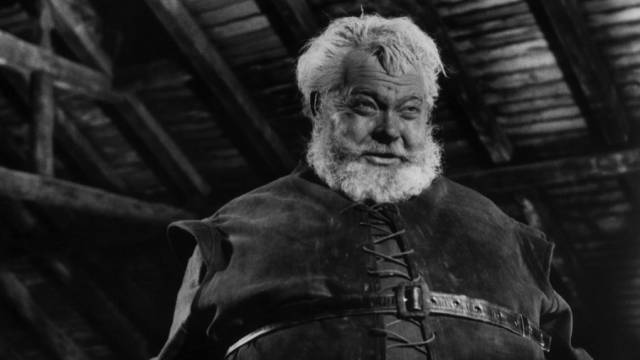
Orson Welles said of Chimes at Midnight "if I wanted to get into heaven on the basis of one movie, that's the one I would offer up. I think it's because it is to me the least flawed”. Coming from the man who directed Citizen Kane that is certainly great praise, and thanks to Janus Films, people will get to see the film in theaters as Welles intended. Starting on January 1, 2016, the film will play a limited theatrical engagement at Film Forum in NYC, and Cinefamily in Los Angeles, with roll out in select cities. While the opportunity to watch anything by Welles should be enough to get you to theaters, here are five more worthy reasons:

5) Shakespeare
Never one to worship idols without deconstructing them, Welles took five of Shakespeare’s plays and extracted what he needed from them for his epic, yet intimate, Chimes at Midnight. The film mostly chronicles the relationship between Sir John Falstaff (Welles) and his paternal relationship with Prince Hal (Keith Baxter) who is often torn between his loyalties to Falstaff, and his biological father King Henry IV (John Gielgud). Mixing and matching from several plays, without any regards to chronology or canon, Welles delivers one of the most vibrant Shakespeare adaptations, a film that’s reverent of the Bard, while understanding that artistic legacies only endure for as long as they remain malleable and relatable to the times when they’re consumed.
How John Gielgud, who was arguable one of the greatest Shakespearean actors of the twentieth century, agree to be in Welles’ unorthodox adaptation is a mystery. But oh what gravitas he brings to his King Henry. Baxter is terrific, and Jeanne Moreau and Margaret Rutherford round up the main players as Doll Tearsheet and Mistress Quickly, respectively, both bringing charm and delicious humor to their roles.
Shooting on a microscopic budget, Welles had to reenact the battle of Shrewsbury with minimal resources, and he achieved it with imaginative cutting and masterful camera work by Edmond Richard. The astonishing DP captures the horrors of battle in an unsentimental way meant to inspire utter repulsion. That he is able to preserve his artistic touch while showing the ugly is testament to Welles’ vision. The battle sequence in particular has gone on to inspire scenes in blockbusters like 300 and other Shakespeare adaptations like Justin Kurzel’s Macbeth, but the rest of the camera and light work shouldn’t be forgotten either, shadows and high contrast are used splendidly to evoke the vastness and chill of the castles in which some scenes unfold, while ceilings come in handy once more, to represent heaven? Oppression? One never knows with Welles, the joy lies in trying to decipher him.
Welles pretended he was shooting Treasure Island just so producers would get him the funds to make a movie. He never wrote a single word for a screenplay of Island, instead concentrating all his efforts on shooting what had been his dream since before even Kane. The film opened at the 1966 Cannes Film Festival where it won the Technical Grand Prize and the 20th Anniversary Prize. It remained for the most part undistributed in the United States, where critics were less kind to it than the Cannes jury. As with most of Welles’ work it would take decades for people to acknowledge its brilliance.
Welles drew out the many parallels that existed between him and Falstaff of many occasions, he viewed him as Shakespeare’s greatest creation, and given his outlandish ego, it’s not entirely wrong to assume he thought of himself as the universe’s magnum opus too. Perhaps because of his love for this character he infuses him with a warmth that was never evident in his earlier, much more cerebral work. His Falstaff is larger than life, at times monstrous, but always approachable and human. As a director, he knew better than to let his character swallow everyone around him, and his scenes with Baxter for example, ache with melancholy. As an actor, Welles got to use his incredibly expressive eyes like never before, Falstaff is his one character that relies little on external elements and is all about the man underneath.
Chimes at Midnight opens in select theaters on January 1. To see when it plays near you click here.